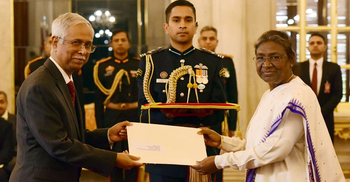China moves to curb protests, some COVID curbs eased

Police in China have moved against protests taking place in multiple cities across the country, as authorities in some areas began to modify the harsh COVID-19 restrictions that are fuelling the unrest.
The anger erupted after a fire in a tower block in Urumqi in the far western region of Xinjiang in which 10 people died after being overcome by toxic smoke.
Protesters said firefighters had been unable to reach residents because of barriers erected as part of a prolonged coronavirus lockdown, although officials denied the building was sealed off.
The Urumqi blaze led to protests in multiple cities across China, including the capital Beijing and the country’s biggest city Shanghai, as frustration at the prolonged lockdowns and harsh restrictions associated with the government’s zero-COVID strategy boiled over.
There was a heavy police presence in cities where protests had been held, with officers in Shanghai moving to detain several demonstrators and taking them away in a bus. Barriers were also erected along the street to prevent people from gathering.
Another rally was held in Beijing on Monday, according to AFP, but one of the protesters told the news agency that she and five of her friends who attended the rally were called by Beijing police demanding information on their movements.
In one case, she said, a police officer visited her friend’s home after they refused to answer their phone.
“He said my name and asked me whether I went to the Liangma river last night… he asked very specifically how many people were there, what time I went, how I heard about it,” she said, asking for anonymity for safety reasons.
A protest at Liangma the previous day attracted about 400 people and rows of police vehicles were in place at the site on Monday.
“People are not just demanding the restrictions to be lifted, they are demanding for freedom, for the rule of law, for democracy,” Human Rights Watch’s Senior China Researcher Yaqiu Wang told Al Jazeera. “People have pent-up anger towards the COVID policy but at the same time they know that the reason we still have abusive, unscientific COVID policies is because of the political system, because one man in Beijing - Xi Jinping - wants it. They are connecting the dots.”
The spread of the highly-infectious Omicron BF.7 coronavirus subvariant is the most severe test of China’s approach to dealing with the virus since the first cases were detected in the central city of Wuhan three years ago.
Zhang Jun, the Chinese ambassador to the United Nations, told Al Jazeera that China could not abandon zero-COVID.
“While some countries are moving in a different direction that’s at the sacrifice of the people,” he said from New York City. “They have so many people dead but that’s not the situation we want to see. Of course, you might say you prefer more liberty, more freedom, but then you have to be prepared to die.”
‘Optimising’ the response
China’s National Health Commission reported 38,645 new cases of the virus on Tuesday, down slightly from the record highs of the past few days.
Seven people - all of them older than 80 - have died in China since the latest outbreak began. Beijing has pointed to the relatively low vaccination rate among older people, who are more susceptible to the disease, as one of the reasons it needs to persist with zero-COVID.
The Global Times, a state-run tabloid, said several cities were now “optimizing” their response “to take more targeted, science-based actions to curb flare-ups”, reflecting advice on COVID-19 responses announced earlier this month.
“The authorities have stressed that optimizing and adjusting the measures does not mean loosening prevention and control, nor is it a lifting of COVID-19 restrictions or “lying flat” in fighting the virus,” the newspaper said.
Deliveries and transport services began operating again in Urumqi on Tuesday, with flights to some other Chinese cities also resuming, according to state media.
In the southern city of Guangzhou, which is home to some 19 million people, residents have been told they do not need to take COVID-19 tests daily if they are already staying at home, such as the elderly or students taking online classes, the Global Times reported on Tuesday.
In southwest Chongqing, people who live in areas with no positive cases in the latest five days will not be required to participate in mass testing, it added.
In the capital, authorities stressed on Sunday that firefighting access and community entrances could not be blocked during coronavirus lockdowns.
Source: Aljazeera and news agencies







